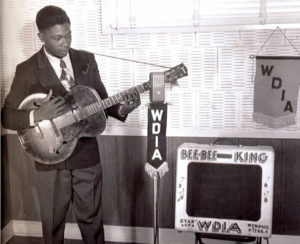Memphis, the home of the blues, was a college of learning for me.
-
October 1998
Volume49Issue6
One day in 1946 twenty-one-year-old Riley King, of lndianola, Mississippi, caught a ride on a grocery truck all the way to Memphis, about 140 miles north. He had a good job as a tractor driver but was filled with restlessness and vague ambition; a part-time gospel singer and street-corner guitar picker, he wanted to sing on the radio and make records. He stayed in the big city a few months, got homesick, and returned to lndianola. But in 1947 he was back in Memphis—and would soon metamorphose into the well-known radio personality B. B. (for “Blues Boy”) King, spinning records on radio station WDIA by day and burning up the surrounding countryside at night with his hot guitar.
At seventy-three B. B. King is an authentic American hero, and Memphis was his launching pad, where he polished the Delta blues of his childhood into the stinging, unmistakable sound that made him King of the Blues, one of the world’s greatest and best-known performing artists. —Tony Scherman

When I was a young man in Mississippi, I thought of Memphis as a fantasyland, a place where there were studios to record in and music stores with windows filled with shiny instruments. A place where you could do anything and get anything.
When I got there, it was no fairy tale. I was broke and hungry. Still, I was excited to be seeing things I’d never seen before. People going to work looking like they were dressed for Sunday — beautiful suits, ties, nice shoes — and all I’d ever worn was high-hip boots and overalls.
I quickly learned that everything was happening on Beale Street. You could see people dancing in the park; you could see famous musicians just walking around, people I’d only heard of. Count Basic, Duke Ellington, Louis Jordan. People of that caliber.
If you had a quarter, you could get a good meal that would last you all day at a place called the One Minute Café. Fifteen cents’ worth of chili, nickel’s worth of crackers, and the boys made a drink with different flavors, orange, grape, and so on, and you’d get one of those, we called it bellywasher. That would be your meal for a whole day, for a quarter — at a time when I didn’t have many quarters, you can bet on that.
They had three theaters on Beale, the New Daisy, the Old Daisy, and the Palace. The Palace was where you went to hear the people I just mentioned, the elite in music. The Palace also had the amateur show every Wednesday night, where Rufus Thomas was emcee. I went on it every chance I could. I never won. Never. Then there was the Domino Lounge. That was the leading nightspot, where they had dances, floorshows, and the owner was a great guy named Sunbeam Mitchell.
Local entertainers? Well, naturally I admired Rufus Thomas. He had a partner then, and they were called Rufus and Bones. There was a wonderful big band led by Al Jackson, Sr., whose son Al Junior became the famous Stax drummer. You’ve heard of the great piano player Phineas Newborn, Jr. Well, his daddy, Phineas Senior, was the drummer in a great band called Tuff Green’s, with Phineas Junior on piano and his brother Calvin on guitar.
Memphis was like a college of learning for me. I still go back every chance I can. The town’s changed for the better. The economics is different. We have a club on Beale Street called the B. B. King Blues Club, and there are many others opening up now, and Memphis is known around the world. It’s starting to recapture some of the popularity it once had. It’s the home of the blues. Chicago claims to be, but Memphis is the home of the blues.

